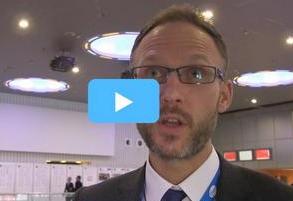Advertisment
ECCO 2016: Dr Charlie Lees (Edinburgh, UK) discusses in the video and article below the factors influencing the decision to stop treatment and discussed whether it may be possible to predict relapse using currently available methods

Stopping drugs – by Maria Dalby
Charles Lees (Edinburgh, UK)
Medication constitutes a large part of the IBD exposome, and stopping drug treatment should be a therapeutic goal once stable durable remission has been achieved – for safety reasons and to reduce costs. However, there are a number of factors that need to be considered – not least patient-related factors such as preference and timing in relation to life events. Dr Charlie Lees from Edinburgh highlighted the factors influencing the decision to stop treatment and discussed whether it may be possible to predict relapse using currently available methods.
The prevalence of IBD is increasing all over the world, especially in young people. At the same time clinicians have a larger therapeutic toolkit than ever available for inducing and maintaining remission and monitoring disease control. Patients expect their treatments to provide relief from pain and debilitating symptoms and allow them to lead a normal life and continue with school or work with a normal quality of life; physicians, on the other hand, want to achieve more long-term goals of achieving deep remission, avoiding surgery and preventing complications. Withdrawing drug treatment to minimise long-term drug toxicity is an integral part of this, but in each case the benefit of stopping must be weighed against the risk.
The two most dangerous drugs that are used routinely in the management of IBD are steroids and opioids – stopping these should be considered before anything else. Amongst other treatments the main candidate for withdrawal is the thiopurine class. By now it is well established that prolonged thiopurine therapy increases the risk of developing lymphoma1 and non-melanoma skin cancer (NMSC).2 The 4-fold increase in the lymphoma risk is a particular concern in elderly patients as the background risk increases with age. Lymphoma and NMSC signals have also been detected with long-term anti-TNF therapy, as well as a significantly increased risk of developing opportunistic infections.3
Growing patient numbers and increasingly sophisticated treatment options also mean the cost of IBD is escalating. A review published in 2013 estimated the direct annual healthcare costs of IBD in Europe to between 4.6 and 5.6 billion Euros4 – a cost burden that is difficult to sustain for publically funded healthcare systems. Consequently, healthcare bodies such as the National Institute for Health and Care Excellence (NICE) in the UK have issued guidelines recommending that stopping anti-TNF therapy in patients who are in stable remission. However, retrospective study data shows that whilst thiopurine therapy can be withdrawn relatively safely with relapse rates in the order of 20% in CD and 12% in UC after 12 months,5 relapse rates after stopping anti-TNF therapy are considerably higher at 36% and 42%, respectively.6 This is consistent with the findings in the STORI study which showed a 12-month relapse rate of 43.9% in CD patients who stopped infliximab treatment.7 After a median follow-up period of 79 months, 75% of patients had restarted therapy and 13% had required surgical resection.8 Systematic reviews and meta-analyses show consistent relapse rates at 12 months of around 40% in both UC and CD.6 That said, this data also showed that patients who restarted anti-TNF therapy had a response rate of 90% in CD and 80% in UC, and Dr Lees suggested that instead of never stopping anti-TNF therapy for fear of triggering a flare, treatment should be regarded as cyclical and all maintenance therapy stopped after 12 months regardless. The challenge then becomes monitoring of disease activity; the STORI study shows that faecal calprotectin predicts relapse and begins to rise about 4 months before the clinical flare, thus giving an ample window for reassessment and re-initiation of therapy to recapture response.9
One of the key factors to consider when stopping treatment is the patient’s preferences and circumstances – treatment should not be stopped just as the patient is about to eg sit an important exam or start a new job. And in addition to stopping drugs, other harmful contributors to the IBD exposome should also be stopped, such as smoking and processed food.
References
- Beaugerie L, Brousse N, Bouvier AM, et al. Lymphoproliferative disorders in patients receiving thiopurines for inflammatory bowel disease: a prospective observational cohort study. Lancet 2009;374:1617-25.
- Peyrin-Biroulet L, Khosrotehrani K, Carrat F, et al. Increased risk for nonmelanoma skin cancers in patients who receive thiopurines for inflammatory bowel disease. Gastroenterology 2011;141:1621-28 e1-5.
- Ford AC, Peyrin-Biroulet L. Opportunistic infections with anti-tumor necrosis factor-alpha therapy in inflammatory bowel disease: meta-analysis of randomized controlled trials. Am J Gastroenterol 2013;108:1268-76.
- Burisch J, Jess T, Martinato M, et al. The burden of inflammatory bowel disease in Europe. J Crohns Colitis 2013;7:322-37.
- Kennedy NA, Kalla R, Warner B, et al. Thiopurine withdrawal during sustained clinical remission in inflammatory bowel disease: relapse and recapture rates, with predictive factors in 237 patients. Aliment Pharmacol Ther 2014;40:1313-23.
- Kennedy NA, Warner B, Johnston EL, et al. Relapse after withdrawal from anti-TNF therapy for inflammatory bowel disease: an observational study, plus systematic review and meta-analysis. Aliment Pharmacol Ther 2016.
- Louis E, Mary JY, Vernier-Massouille G, et al. Maintenance of remission among patients with Crohn’s disease on antimetabolite therapy after infliximab therapy is stopped. Gastroenterology 2012;142:63-70 e5; quiz e31.
- Reenaers C, Nachury M, Bouhnik Y, et al. OP093 LONG-TERM OUTCOME AFTER INFLIXIMAB WITHDRAWAL FOR SUSTAINED REMISSION IN CROHNS DISEASE. United European Gastroenterology Journal 2015;3:A31.
- Suray Nd, Salleron J, Vernier-Massouille G, et al. P274. Close monitoring of CRP and fecal calprotectin levels to predict relapse in Crohn’s disease patients. A sub‑analysis of the STORI study ECCO, 2012.





